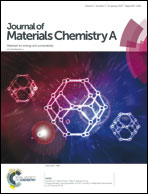Honeycomb-layer structured Na3Ni2BiO6 as a high voltage and long life cathode material for sodium-ion batteries†
Abstract
The need to find sodium ion battery (SIB) cathodes with high voltage, capacity and improved cycle life has stimulated research on sodium containing layered transition metal oxides. With this perspective, the electrochemical properties of highly ordered, honeycomb layered Na3Ni2BiO6 with a monoclinic superstructure are explored as a cathode material in SIBs. It has been demonstrated that Na3Ni2BiO6 delivers a discharge capacity of 106 mA h g−1, having high voltage plateaus at 3.50 and 3.25 V, with marginal capacity fading after 50 cycles. Operando X-ray diffraction studies during charging/discharging reveal two reversible two-phase transition mechanisms (initial O3 phase → P3 intermediate phase → O1 final phase) during sodium extraction. Ex situ X-ray absorption spectroscopy reveals the charge compensation mechanism for the reversible Ni3+/Ni2+ as an active redox couple while Bi5+ being inactive during cycling. Extended X-ray absorption fine structure analysis shows highly reversible local structural changes around both Ni and Bi atoms occurring during electrochemical cycling. In addition, unique local structure changes especially around Ni atoms due to the honeycomb ordering and size mismatch between Ni2+ and Bi5+ ions are revealed by EXAFS analysis during charging and discharging, which is quite different from the local structure changes in regular layer structured NaMO2 (M = transition metals) cathode materials. The present results suggest that honeycomb layered metal oxides with the general formula, Na3M(II)2M(V)O6, can be considered as candidates for high voltage and long life cathode materials for SIBs.



 Please wait while we load your content...
Please wait while we load your content...